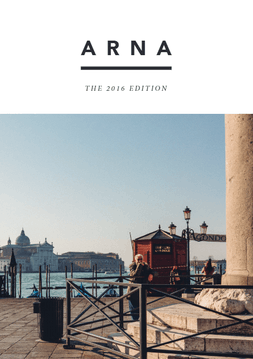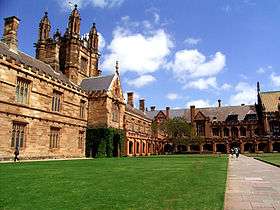Arna (publication)
Arna, commonly styled as ARNA, is an annual literary journal published by the University of Sydney Arts Students Society. Originally named The Arts Journal of the University of Sydney, it was published regularly between 1918 and 1974 under the auspices of the Faculty of Arts and in 1938 the journal was renamed The ARNA: The Journal of the Arts Society. Publishing of the journal ceased unexpectedly in 1974.
 Front cover of the 2016 edition of ARNA Literary Journal. | |
| Editors | Kate Scott and Jenna Lorge |
|---|---|
| Categories | Literature, art |
| Frequency | Annually |
| Publisher | Sydney Arts Students Society (provided by the University of Sydney Union) |
| Year founded | 1918 |
| Country | Australia |
| Based in | Sydney |
| Language | English |
| Website | www |
After a hiatus of 34 years, publication recommenced in 2008 with the revival of the Sydney Arts Students' Society. Former distinguished editors and contributors include Samuel Beckett,[1] Robert Hughes, Clive James, Lex Banning, Harold Stewart, Geoffrey Lehmann and Les Murray.[2] The editors-in-chief for 2020 are Kate Scott and Jenna Lorge.
Content
The journal includes predominantly prose fiction, poetry, and visual art. Since 2008, more varied forms have appeared in the journal including radio scripts, photography, and academic essays.
Editorship
The editors-in-chief of Arna hold dual roles, also performing duties as Publications Officer in the Sydney Arts Students Society and are elected to the role in the Annual General Meeting held at the conclusion of the academic year alongside the other positions on the society's executive. This has attracted controversy in the past as elected editors are chosen in a popular election rather than for experience with the journal.
Past editors
- 2020: Kate Scott and Jenna Lorge
- 2019: Nikole Evans and Doris Prodanovic
- 2018: Alisha Brown and Robin Eames
- 2017: Izabella Antoniou and Jack Gibson
- 2016: Eden Caceda and Lamya Rahman
- 2015: Whitney Duan and Tahlia Pajaczkowska-Russell
- 2014: Nick Fahy and Madeleine Konstantinidis
- 2013: Lane Sainty and Alberta McKenzie
- 2012: Alex McKinnon and Eleanor Gordon-Smith
- 2011: Anne Widjaja and Richard Withers
- 2010: Paul Ellis and Julian Larnach
- 2009: Callie Henderson and Nancy Lee
- 2008: Rebecca Santos and Khym Scott
References
- Beckett S How it is (Extract from Comment c'est, translated from the French by the author) in ARNA 1962
- ARNA 2008. The Journal of the University of Sydney Arts Students Society at Sydney University Press Archived 12 November 2009 at the Wayback Machine
Further reading
- Barcan, A Student activists at Sydney University 1960-1967 Australian and New Zealand History of Education Society (ANZHES), January 2007. The retired education professor Alan Barcan published his personal view of activism at Sydney University during the 1960s, including references to the student publications Honi Soit, Hermes and Arna
